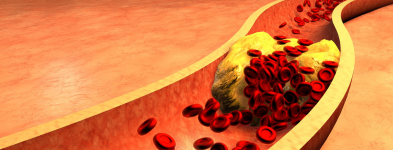

6 minute read
Cholesterol 101: The good, the bad, & the importance of balance
Published October 9, 2024. Last updated January 13, 2026.
Cholesterol, often misunderstood, is essential to life and plays a critical role in many of your bodily functions. But keeping the right balance between its helpful and harmful effects is vital to staying healthy.¹
Although cholesterol levels are extremely important, understanding the different types of cholesterol, their functions, the risk factors that influence your levels, and how to manage them is crucial for proactively managing your health. By taking charge of your cholesterol, you can potentially reduce your risk of heart disease and other related conditions.
What's cholesterol?
Cholesterol is a waxy, fat-like substance (lipid) that's found in all the cells in your body. It's essential for building cell membranes and making hormones (like estrogen and testosterone), vitamin D, and digestive fluids.²
Where does cholesterol come from?
Your liver makes all the cholesterol your body needs. Any extra comes from certain foods, though it isn't needed. Since animals, including humans, make cholesterol, consuming animal products like meat, poultry, dairy, or eggs can increase the amount of cholesterol in your body. Plants don't produce cholesterol. So, whole, unprocessed plant foods don't contain it.²
How many types of cholesterol are there?
Cholesterol, a type of lipid, doesn't mix with water. Since blood is mostly water, cholesterol can't circulate freely in the bloodstream. Instead, the body packages cholesterol into particles called lipoproteins. Lipoproteins carry cholesterol and other fats through the bloodstream to where they're needed.¹ There are different types of lipoproteins, each with their own function. The 2 main types are:
- High-density lipoproteins (HDL)
- Low-density lipoproteins (LDL)
What's HDL cholesterol?
HDL cholesterol (HDL-C) is known as "good" cholesterol. It's carried by high-density lipoproteins, which are mostly made of protein. These particles pick up extra cholesterol from your blood and tissues. HDL then carries this cholesterol to your liver, where it can be broken down and removed from your body. This process is important because it helps regulate cholesterol levels and supports heart health.¹
What's LDL cholesterol?
LDL cholesterol (LDL-C) is often referred to as "bad" cholesterol. It's carried by low-density lipoproteins, which contain more cholesterol than protein. These particles transport cholesterol throughout your body, delivering it to cells that need it. But when there's too much LDL cholesterol in your blood, it can build up on the walls of your arteries. This buildup, called plaque, can narrow your arteries and increase your risk of heart attack, stroke, and other health conditions.¹


What's lipoprotein(a)?
Lipoprotein(a), or Lp(a) is another type of lipoprotein that carries cholesterol through the bloodstream. Lp(a) is similar to LDL, but has an extra protein attached to it. This is what makes Lp(a) different from other lipoproteins. It also tends to be “stickier,” which could make it more likely to build up in the walls of your blood vessels. This can put you at risk for cardiovascular disease (heart and blood vessel disease).
Lp(a) levels are tied to a specific gene in your DNA inherited from your parents. Lp(a) levels appear in your body by age 5 and usually remain the same throughout your life. Lp(a) levels can also rise in women and remain elevated after menopause when estrogen levels decrease.
Check your Lp(a) levels with Quest’s Lipoprotein(a)/Lp(a) Test or High-Risk Heart Health Lipid and Lp(a) Panel
► Read & learn more about lipoprotein(a) and its associated health risks: What is Lp(a)? And what do I need to know about it?
► Read & learn more about menopause and its associated health risks: Menopause: Understanding the stages, ages, signs, and symptoms
Are triglycerides the same as cholesterol?
No, they're different types of lipids. Triglycerides are the most common type of fat in the body, and come from foods like oils, dairy products, and meat. If you consume more calories than your body needs, it will convert the excess into triglycerides and store them in fat cells for future use.⁴ While triglycerides are necessary for good health and provide critical sources of energy, having high triglyceride levels along with high LDL-C or low HDL-C can increase the risk of heart attack and stroke.⁵


What causes high cholesterol?
Several factors can increase the risk of high LDL-C levels, including⁶:
- Age
- Family history
- Familial hypercholesterolemia (an inherited genetic condition causing high LDL-C)
- Certain medications
- Obesity
- Lack of movement or physical activity
- Diet (eating foods high in saturated fats or trans-fatty acids)
- Tobacco use
- Alcohol use
- Chronic stress
- Perimenopause and menopause
- Chronic inflammation
- Hypertension (high blood pressure)
- Chronic kidney disease
- Hyperthyroidism (overactive thyroid) and hypothyroidism (underactive thyroid)
- Diabetes (type 1 and type 2)
- Polycystic ovary syndrome
- HIV
- Lupus
While some risk factors, like age or family history, are beyond your control, others aren't. Eating heart-friendly foods, staying active, and maintaining a healthy weight can all make a positive impact. If these lifestyle changes aren't enough, you and your doctor can work together to explore other options. It’s important to get tested and detect high cholesterol early. The sooner you know, the earlier you can take action to get your numbers in a healthier range.⁶
How can high cholesterol affect my health?
High cholesterol can lead to serious health problems over time. When there's too much cholesterol in the blood, it can build up as plaque on the inner walls of the blood vessels. This process is called atherosclerosis (ath-uh-roh-skluh-roh-sis). As plaque accumulates, it narrows the blood vessels, making it harder for blood to flow through them. Because the blood vessels deliver blood throughout the body, problems in one area can also affect another.⁷
The impact of high cholesterol depends on which blood vessels are affected. It can increase the risk of certain medical conditions, as different parts of the body may not get the blood flow they need. This is why managing your cholesterol levels is so important for overall health.⁷
Atherosclerosis can lead to serious conditions, including[⁶ ⁻ ⁷]:
- Hypertension
- Coronary artery disease (blocked blood flow to the heart)
- Peripheral artery disease (blocked blood flow to the arms and legs)
- Carotid artery disease (blocked blood flow to the brain)
- Heart attack
- Stroke
High cholesterol can silently lead to the accumulation of plaque. This process can continue and go unnoticed for years. That's why regular cholesterol checks are so important. These blood tests can reveal potential problems before they lead to serious health issues, giving you a chance to take action early.⁷
How do I know if my cholesterol or Lp(a) is high?
Most people with high levels of cholesterol or Lp(a) don't know it because they don't have any symptoms. Even those with a healthy lifestyle could have elevated levels. A blood test is the only way to know for sure if you have high cholesterol or Lp(a).⁶ ⁻ ⁷
How often should I get my cholesterol checked?
When and how often depends on your age, health risks, and family history. Your doctor can help you decide how often is right for you.¹ ⁻ ² Regular cholesterol testing is important for understanding your risk of heart disease, tracking changes over time, and proactively managing your health.
Know your cholesterol numbers (and the bigger picture) with Quest
Total Cholesterol Test measures the total amount of cholesterol in your blood based on your HDL and LDL levels.
Cholesterol (Lipid) Panel measures total cholesterol, triglycerides, HDL, LDL, cholesterol/HDL ratio (the ratio of HDL to your total cholesterol), and non-HDL (the combined amount of cholesterol in the blood that is not HDL cholesterol) levels in the blood.
Advanced Heart Health Test Panel (with ApoB) measures traditional cholesterol, triglyceride, and hs-CRP levels, as well as advanced biomarkers (apolipoprotein B, lipoprotein(a), and Lp-PLA2 activity) to assess your personalized risk of cardiovascular disease (CVD) or stroke.
Cholesterol testing for children ages 13+
Parents and guardians can purchase the Quest Cholesterol (Lipid) Panel and the Quest Total Cholesterol Test for their children (ages 13+) at questhealth.com. No doctor visit is required for purchase, but physician oversight is included throughout the process.
Quest’s Health Profiles include cholesterol testing as part of assessing your overall wellness and heart health. High cholesterol can occur without obvious signs or symptoms—regular testing can help catch potential issues early. Explore which Quest Health Profile best fits your needs, and your budget:
- The Basic (Men's and Women's versions) includes key lab tests to help you check in on your overall health and wellness (CBC, CMP, Cholesterol panel, urinalysis, and TSH for women or testosterone for men)
- The Comprehensive (Men's and Women's versions) provides everything found in the Basic Panel plus additional heart, inflammation, metabolic, and nutrition markers (hs-CRP, HbA1c, and vitamin D), as well as biometrics and a personalized health score, allowing you to track your wellness over time
- The Elite (suitable for both men and women) includes everything found in the Comprehensive Panel and also offers additional heart, hormone, metabolic, and nutrition markers (ApoB; thyroid markers TSH, T3, and T4; testosterone for both men and women; insulin, ferritin, vitamin B12, and folate)
No doctor visit is required to buy your own lab test at questhealth.com. PWNHealth and its affiliates review your purchase to ensure it is medically appropriate before submitting the test order for processing. PWNHealth also reviews your test results and will contact you directly if they require prompt attention. Included in each purchase is the ability to discuss your test results with an independent healthcare provider; however, you are also encouraged to speak with your primary healthcare provider.
Tests featured in this article:
References
- Cleveland Clinic. What is cholesterol? Accessed September 16, 2024. https://my.clevelandclinic.org/health/articles/23922-what-is-cholesterol
- Centers for Disease Control and Prevention (CDC). Cholesterol. Accessed September 16, 2024. https://www.cdc.gov/cholesterol
- Martin SS, Aday AW, Almarzooq ZI, et al. 2024 heart disease and stroke statistics: a report of US and global data from the American Heart Association. Circulation. 2024;149(8). doi:10.1161/cir.0000000000001209
- National Heart, Lung, and Blood Institute (NHLBI). High blood triglycerides. Accessed September 16, 2024. https://www.nhlbi.nih.gov/health/high-blood-triglycerides
- American Heart Association (AHA). HDL (good), LDL (bad) cholesterol and triglycerides. Accessed September 16, 2024. https://www.heart.org/en/health-topics/cholesterol/hdl-good-ldl-bad-cholesterol-and-triglycerides
- Cleveland Clinic. High cholesterol diseases. Accessed September 16, 2024. https://my.clevelandclinic.org/health/articles/11918-cholesterol-high-cholesterol-diseases
- Cleveland Clinic. Cholesterol levels. Accessed September 16, 2024. https://my.clevelandclinic.org/health/articles/11920-cholesterol-numbers-what-do-they-mean
- American Heart Association (AHA). Lipoprotein(a). September 16, 2024. https://www.heart.org/en/health-topics/cholesterol/genetic-conditions/lipoprotein-a
Other articles you may be interested in
Remove Product?
Shop Tests
Top Nav Jump Mobile
Top Nav Jump Shop Tests
Top Nav Jump Help Me Choose
Top Nav Jump Discover
Verify that it's you
We sent a verification code to
Haven't received a code or need a new code? Resend a new code
It may take a minute to receive your code. Be sure to check your email filter or spam folders.
All rights reserved. Copyright 2023
Address Verification
Quest does not currently support P.O. Box addresses, please update to a valid address.






